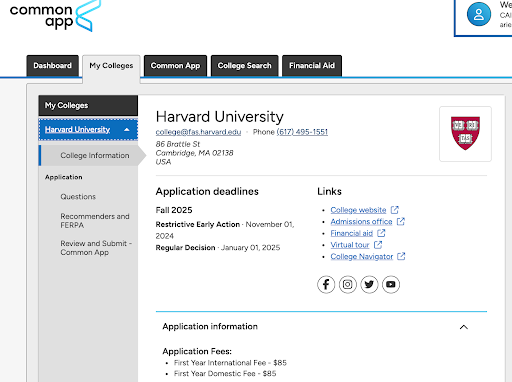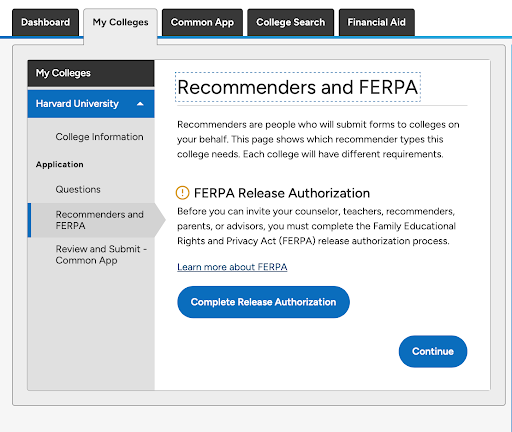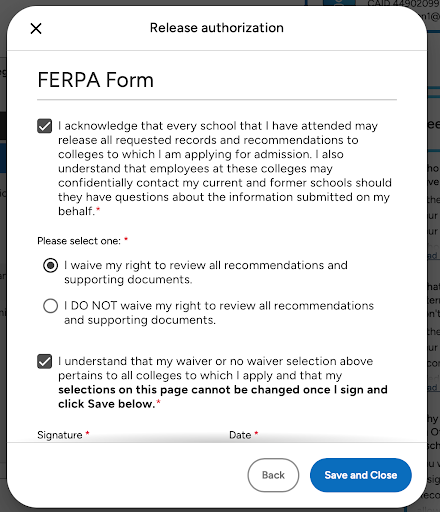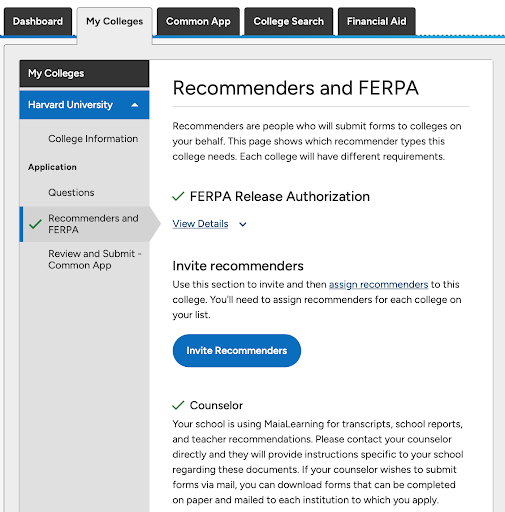Letters of Recommendation
Letters of Recommendation are an important component of your college application. They give the admission officers an exterior perspective on your application and are used to add context to your academic record and extracurricular activities.
Take a look at the results in Column E of your Application Requirements Tracker. After reviewing all of the recommendation requirements for the schools on your list, you will likely find that you need to request 2-3 letters of recommendation from academic references and 1-2 non-academic recommendations.
Your academic references should generally be one of your teachers during your sophomore (10th grade/seconde), junior (11th grade/première), or senior (12th grade/terminale) courses. Junior-year teachers are the most common.
Non-academic references can be written by supervisors or mentors who have observed you in a non-academic capacity. This may include your coach for a sport, a supervisor at a place of work, a religious or community leader, or a teacher who has supervised an extracurricular activity at school (school council, band or orchestra, etc.).
There are a couple of things to keep in mind when deciding who to ask for letters of recommendation.
Think of your letters of reference as a way to complement the other materials in your application
You inevitably will not be able to write about every informative experience you have had in high school. As a result, you can strategically request recommendations from mentors or supervisors that will highlight a particular experience or strength not adequately covered elsewhere in your application.
Academic references do not need to be written from teachers who have given you the highest grades
Rather, the best letters of recommendation will be written from teachers who know you best and can provide specific examples about your approach to learning and performance in the classroom. You may very well want to request a letter from a teacher who taught a subject that was difficult for you and you earned a lower grade in comparison to a teacher who gave you a better grade but never interacted outside of class. Although this may seem unintuitive, there is a good reason for it. If you worked very hard at a difficult subject (frequently going to office hours, being attentive in class, diligently completing your homework, etc.), that teacher can testify to your work ethic, resilience, and growth-mindset. Admission officers know that students will struggle with some subjects more than others. What they care about more than your GPA is knowing that you can persist through academic challenges. A letter of recommendation is a great way to demonstrate these positive attributes!
You’ll want to plan well in advance for eventually requesting letters of recommendation
This means cultivating strong professional relationships with your teachers and non-academic supervisors during and before your junior year of high school. In school, this means participating actively in class, going to office hours, and trying hard in your classes. Outside of school, this means committing to a small number (1-2) extracurriculars or other responsibilities for long enough for your extracurricular mentor, coach, or community leader to be able to write a strong and specific reference letter. You will not be able to ask all of your teachers and mentors for a letter of reference. Rather, early in your high school career, it is important for you to practice developing strong professional relationships with teachers and mentors such that you have many options to choose from throughout your academic career!
How to Request a Letter of Recommendation
Make sure to ask your recommenders at least 3 weeks before the application deadline to write you a letter of reference. You can begin to ask for references as early as the end of your Junior year. It is advantageous to ask for letters as early as possible; junior year teachers in particular are often asked by multiple students. You do not want to be in the situation where a recommender says no to your request because you are the 11th student to ask and they only have time to write 10!
Ask for your letters of recommendation
You can either ask your reference for a letter in-person or through a thoughtful well-drafted email. You can use the following academic and non-academic templates to draft your requests. Reminder: do not just copy and paste this template!! Make sure to tailor your email to the teacher or mentor you are asking!
Academic Reference Email Template:
Dear [Mr./Ms./Mrs./Dr.] [Last Name],
I hope you’re doing well! I’m writing to ask if you would be willing to write me a letter of recommendation for my college applications.
I’ve really appreciated having you as my [subject] teacher, and your class had a big impact on me. The support and guidance you’ve offered throughout the year have meant a lot, and I believe you could speak to both my work ethic and character in a way that would really help strengthen my applications.
If you’re open to writing a letter, I’d be very grateful. I’d be happy to share more details, like my resume, a list of the colleges I’m applying to, or anything else that would be helpful.
Thank you so much for considering this—I truly appreciate your time and support.
Sincerely,
[Your Full Name]
Non-Academic Reference Email Template:
Dear [Coach/Mr./Ms./First Name] [Last Name],
I hope you’re doing well! I’m reaching out to ask if you would be willing to write me a letter of recommendation for my college applications.
Being part of [team/organization/job/club] has been a really important part of my high school experience, and I’ve learned so much from your leadership. I’ve appreciated your support and the opportunities you’ve given me to grow, and I think you could provide a meaningful perspective on who I am outside the classroom.
If you’d be willing, I would really appreciate your help. I can provide more details—like my resume or a list of schools I’m applying to—if that would be helpful.
Thank you so much for considering this. I’m really grateful for your support!
Best,
[Your Full Name]
Providing your reference with proper guidance
After your recommender responds with a resounding “Yes, of course!” you will need to provide your recommender with some important information to prepare your letter. If you have asked your recommender for a reference in your Junior year, you may respond by saying “Thank you, I will provide you with more information about the application process over the summer.” Once you are closer to the application deadline, you will need to get and provide your recommender with some important information:
- Provide them with a list of schools you are planning to apply to. Recommenders only need to submit one reference to all Common App schools. Once you have added this recommender to your Common App (instructions provided in Step 3), they will receive a link to submit your letter to the portal. If you are applying to non-Common App schools (Georgetown, MIT, University of California-system schools), they will need to submit additional letters of reference to these portals. You should let them know to keep an eye out for links to these portals once you have submitted their names as references.
- Ask your recommender what the best email is for them to receive links to the application portals.
- Provide them with your Common App number (and applicant number for other application portals in applicable)
- Send them your transcript and résumé so they are aware of your recent activities and academic record. You may also send them a draft of your personal essay if relevant and appropriate.
- Provide them with guidance on what to include in the letter: If you have determined that this recommender can complement aspects of your application in an important way, you can respectfully suggest that your recommender include an anecdote that highlights a particular attribute you would like to demonstrate to the admission committees.
Adding your reference to the Common App
Once and only once your reference has agreed to write a letter of recommendation on behalf and provided you with the best email to reach them can you add them as a reference on the Common App (and other application portals). In the following section, we provide instructions for adding your reference to the Common App. Other application portals will have a similar process.
- Navigate to a school on your list under the “My Colleges” tab.
- Click on “Recommenders and FERPA

- Complete the FERPA Release Authorization
Start by clicking on the “Complete Release Authorization”


At this point, you will be asked if you want to waive the right to review confidential letters of recommendation. IMPORTANT: You should always waive your rights to review your recommendations and supporting documents.
Why? Waiving your right lets colleges know that you do not intend to read your recommendations, which helps reassure colleges that the letters are candid and truthful. Failing to waive your rights may tarnish the objectivity of your letters of recommendation and disadvantage you in the admissions process.
Once you reach the FERPA Form stage, make sure that you click “I waive my rights to review all recommendations and supporting documents.” Sign and date the form before clicking “Save & Close.”
Invite Recommenders
Navigate to the “Recommenders and FEPA” tab and click “Invite Recommenders.” Follow the instructions as the portal suggests. To assign academic and non-academic references to this school, first click “Invite Other Recommender.” Then add the email address, relationship, and name of your recommender in the portal. Once you have completed this step, your recommender will receive a link to upload their letter of recommendation into the Common App.

Once you have added a recommender to one school, you can easily assign this recommender to other schools you apply to. For every school that you want to add this recommender to, navigate to that school under the “My Colleges” tab. Under the “Recommender and and FERPA” tab, you can view your list of recommenders already in the system and assign the relevant recommenders to that school.
You will be able to see whether this recommender has uploaded their letter on the “Recommenders and FERPA” tab under each school you apply to.
Reminder: Keep track of your recommender’s progress on the Application Status Tracker. Under every school you apply to, make sure to note whether your recommenders have been “Requested,” “Assigned in the Common App” or “Completed” (aka submitted) their letter of recommendation. If your recommender has not submitted your letter of recommendation after a considerable amount of time, do not hesitate to respectfully remind them. The tasks likely slipped their mind and they need a small reminder to complete it by the deadline! Do not wait until after the application deadline has passed to remind your recommender. You should leave adequate time to find another recommender in the rare circumstance that your original recommender becomes unresponsive or can no longer complete the letter as promised.
